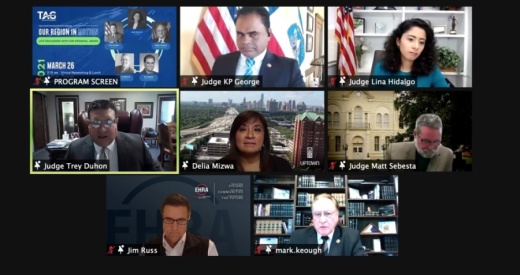TAG-Houston board members moderating the event highlighted several pieces of legislation pertaining to mobility they said would be important to watch this year as well as projects such as the Texas Department of Transportation’s planned $7 billion overhaul of I-45, which recently drew a lawsuit from Harris County claiming TxDOT did not adequately consider the environmental ramifications of the project.
Among the other items TAG-Houston brought up, House Bill 2219 would open accessibility to the Texas Mobility Fund, allowing TxDOT to issue bonds secured by future revenue as legislation previously allowed from 2001 until 2015, according to TxDOT.
House Joint Resolution 99 would call for a constitutional amendment to allow counties to issue bonds or notes for transportation reinvestment zones, which finance the redevelopment of an underdeveloped or blighted area, and bonds could be repaid through increases in property tax revenue, according to the resolution.
County judges agreed the bill would give them additional opportunities to secure funding for projects.
“I’m in full agreement,” Montgomery County Judge Mark Keough said. “We have these tax increment reinvestment zones and financing, but we don’t have it for the county as it relates to transportation projects. It would behoove us to call our representatives here to make that take place. ... Anything that will help us be able to control our destiny as we move forward as local entities especially with the growth happening in Montgomery County. To be able to take a TRZ and find that spot, take unproductive property and turn it into productive property, is just another tool.”
Harris County Judge Lina Hidalgo echoed this support.
“I agree with my colleagues on the importance of local control particularly in this issue. ... For Harris in particular we would use that for transit operations to serve folks outside the [Metropolitan Transit Authority of Harris County] service areas.”
Fort Bend County Judge KP George said the region he governs is growing exponentially as well.
“Having local input and local control and ability to control the TRZ and [those] kinds of tools ... it can only serve better our community.”
Local control is an issue for Waller County Judge Trey Duhan as well, who said being able to control the formation of a TRZ would help to facilitate that.
“I am all about local control. ... As a county judge I can say the more tools you give us to be able to address the problems and issues on a local level the better people will be," Duhan said.
I-45 improvement project
The panel also discussed TxDOT’s proposed project to reroute and expand portions of I-45. Although TxDOT has moved forward with several steps in process, including completing its federally mandated environmental impact studies, Harris County issued a challenge in the form of a lawsuit in March. However, a resolution between TxDOT and the Houston-Galveston Area Council, which funds a portion of the project, was approved March 26.
Hidalgo maintained there were several issues with the proposal that must still be addressed.
“We want a good project,” Hidalgo said at the panel discussion. “The current project as proposed has various issues.”
Hidalgo said wide highways encourage speeding, leading to more highway deaths, and she said quality of life is also affected when communities are dependent on highways for transportation.
"People are not attracted to a community that is solely built on highways where they can’t get to where they need to be without a car,” she said. “When you travel to other countries—modern cities, modern countries—we see there are transit options, and we are lacking those. If we don’t start working on those, we have to catch up to last century, and it’s going to be a problem for our competitiveness and quality of life.”
Hidalgo said the federal government has identified the project as potentially violating civil rights, and it could displace a thousand single multifamily units as well as two schools and several houses of worship.
Keough described the situation as “politically charged.”
“We have a lawsuit here," Keough said. "It has not been proven it’s a civil rights violation that has slowed this process down, so it’s going to be a couple years before we can move forward on this. ...The head of TxDOT said he wanted to work with these issues that were being brought up [and] in steps the lawsuit and it comes to a screeching halt. ... It’s gotten so politically charged it’s on the edge of out of control.”
Brazoria County Judge Matt Sebesta said traffic on the corridor is not going to improve and that he believes the problem requires a resolution by moving forward.
“It’s a project that there’s going to have to be a consensus found because not everybody’s going to be happy,” Sebesta said. “It’s one of those projects [where] you cannot make everyone happy.”





